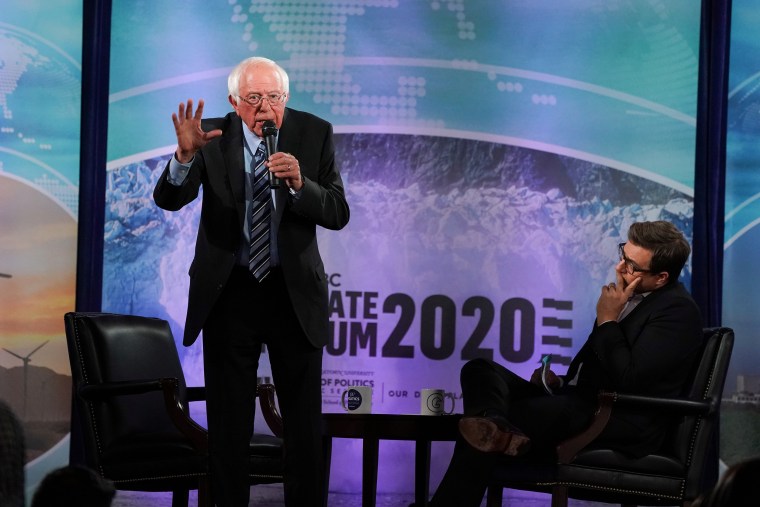For the second time in recent weeks, the Democratic candidates have come together to promote their visions for combating the climate crisis. After the Democratic National Committee refused to sanction a debate on the biggest threat facing humanity, CNN and MSNBC stepped up with separate forums on the issue. Forums are a good way for voters to separate the serious from the unserious and, so far, Sen. Bernie Sanders is emerging as the candidate with the most serious plan.
During the MSNBC forum on Thursday, Sanders highlighted the scale of the issue. He talked about the devastation that was wrought on Paradise, California, last year when fires tore through the town, and the tragedy that befell Puerto Rico after Hurricane Maria. He emphasized that “extreme weather disturbances hitting us more and more frequently with greater intensity” will cause an international humanitarian crisis, which is why the moderate push to be “realistic” won’t cut it. Bold action is needed.
Washington Gov. Jay Inslee deserves credit for elevating the climate crisis as a key 2020 campaign issue. But when he dropped out of the presidential race in late August the title of “climate candidate” was quickly seized by Sanders.
In an ambitious, 13,000-word essay, Sanders’ campaign called the climate crisis “a global emergency” that would disproportionately impact the poor, the working class and people of color. Fighting back will require a mobilization not seen since World War II to radically transform U.S. society in less than 11 years — the deadline scientists have given before global warming in excess of 1.5º C can no longer be avoided. The essay also argued the president who takes on this task will need to “face down the greed of fossil fuel executives,” and during the MSNBC forum, Sanders suggested that could include criminal charges against executives who knew their actions were fueling climate change.
To create this radical transformation, Sanders’ Green New Deal proposes a complete transition to renewable power generation and electric transportation by 2030, with complete decarbonization by 2050. To achieve that, Sanders told the audience at Georgetown University that 20 million jobs would be created to retrofit buildings, manufacture solar panels and wind turbines, electrify the transportation system and build a new high-speed rail system. The plan also commits to working internationally to hold other countries to their commitments and to help poorer countries make the green transition, in recognition of the United States’ historical contribution to global emissions.
Sanders' more than $16 trillion plan may seem extreme, but there’s nothing small about this problem. America will need nothing less than a reorientation of the economy to accomplish this goal, which would be paid for by the sale of clean energy through public utilities, raising taxes on fossil fuel companies and reducing military spending. Such a pivot would also ensure that workers share in the benefits of the transition. As Sanders emphasized during the CNN town hall, no one wants their kids or grandkids to realize we had a chance to change course in 2020 and didn’t take it.
Environmental and progressive organizations appear enthusiastic. Sanders is the only candidate to get an A on his climate plan from Greenpeace; Sen. Elizabeth Warren got an A- and former Vice President Joe Biden originally got a D- before making revisions for a B+. Data for Progress, a progressive think tank, gave Sanders and Inslee “very thorough” rankings on their climate plans with Sanders addressing 44 out of 48 components of a Green New Deal, while Warren's and Biden’s plans were deemed “thorough.” And the political director of the Sunrise Movement, a high-profile youth environmental group pushing for the Green New Deal, declared Sanders’ plan “the biggest and boldest plan and vision out there.”
Warren, by contrast, is approaching the climate crisis as a problem of corruption. She has a comprehensive plan that includes part of what Inslee proposed, but it includes much less spending than Sanders’ and a greater reliance on private corporations taking action once market incentives are reshaped with new regulations, taxes and programs. Sanders believes the scale of necessary change will require more government intervention.
The two largest emitting sectors in the United States are transportation and electricity production, accounting for 29 percent and 28 percent of total emissions, respectively. All of the candidates have plans to move from fossil fuels to renewables, but Sanders supports public ownership of utilities while Warren does not. Taking utilities out of the private market would allow for a more rapid transition because the government would directly decide how electricity is generated instead of trying to influence private companies. There already are campaigns for utility municipalization across the country, and public utilities are the norm across the border in Canada; Ontario shifted from getting a quarter of its power from coal in 2007 to eliminating it completely by 2014.
But transportation is where all the candidates still have the biggest blind spot. They’re happy to talk about electric vehicles, but there’s often little else of substance in their transportation plans. The exception, again, is Sanders. Ahead of the CNN climate town hall, Curbed’s Urbanism Editor Alyssa Walker wrote that only Sanders has a transportation plan that goes into detail on measures beyond electric vehicles, including expanding public transportation, promoting transit-oriented development in cities and increasing residential density. Even Sanders’ plan doesn’t go far enough — but it goes much farther than anyone else’s.
The climate is just one of a range of serious issues that needs a progressive president ready and willing to implement a serious crisis plan in 2020. Sanders and Warren are both leading candidates with ambitious policy agendas, but as the MSNBC town hall re-emphasized, Sanders still comes out ahead.

